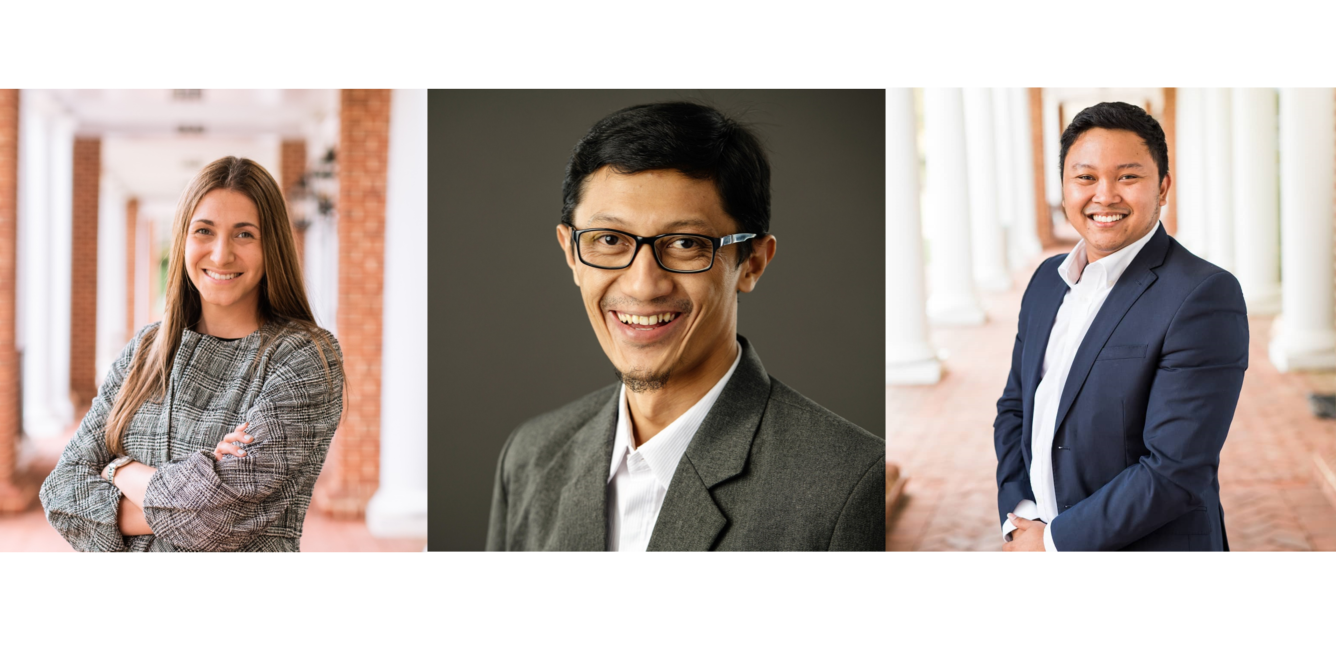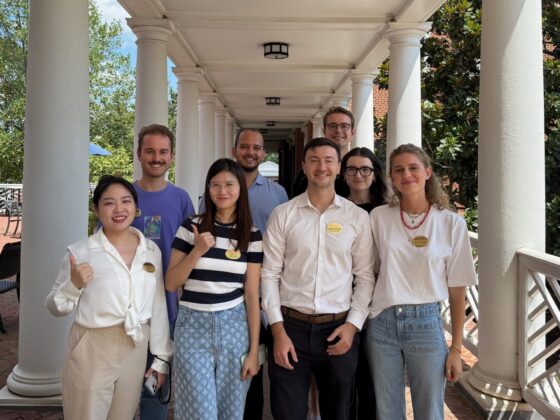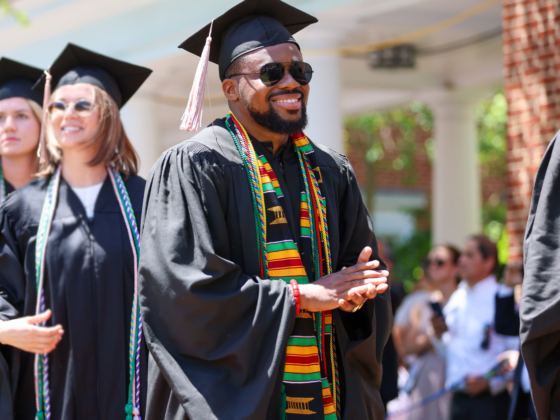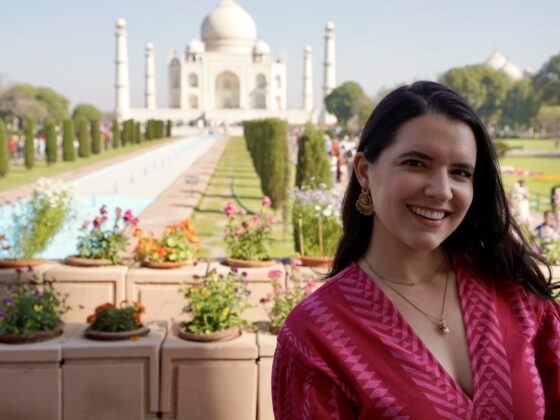By Abigail Quinn
Ali Schumacher (Class of 2021), Rizki Ridwan (EMBA Class of 2021) and Hisardo Dagmar (Class of 2021) are three Darden students who make up a Global Consulting Project (GCP) team. Though in different Darden programs and international locations, their shared passion for education brought their team together to consult with the Indonesian Cyber Education Institute through a Darden GCP offering. They shared more about their unique GCP experience and why the GCP is so meaningful for them in their own words:
Tell us a little bit about your background. What brought you to Darden?
Ali Schumacher: Prior to Darden, I spent five years in technology consulting, working with U.S. federal government and higher education clients on large custom software implementations and digital transformations. I decided to come to Darden because of my interest in the MBA/Master of Education (MEd) dual degree program, which stemmed from seeing the opportunities that technology brings to the education field. I am interested in transforming the way students learn, personalizing the student experience and improving student success by using technology. The dual degree program has allowed me to focus on the intersection of business, education, innovation and technology and to build the knowledge and credibility I needed in education to be effective in the educational technology space.
Hisardo Dagmar: I was a consumer banker prior to my Darden experience. My last position was as a business development manager for an automotive loan product in which I handled the end-to-end aspect of my bank’s automotive loan business, from underwriting policy to pricing and marketing strategies. I liked the job and the people that I worked with, but I reached a point where I needed new intellectual challenges. My VP, who was an Emory Goizueta Business School graduate, recommended business school to me and I decided to follow suit. Long story short, I got accepted into five business schools, but decided to join Darden because I had great interactions with Darden alumni in the Jakarta Chapter. They were humble and great people that showed me how amazing the Darden community would be. Moving forward, I am going back to Indonesia to pursue a career in corporate banking.
Rizki Ridwan: I am currently a VP in a telecom company in Indonesia, handling corporate strategic transformation programs. I enrolled in the global executive MBA program because I was looking for a global MBA program that would allow me to study while I was still employed full-time. The Darden Executive MBA provided the global learning experience I wanted and the highest quality professors, and I am grateful to attend the program with a full scholarship through the Darden Indonesia Fellowship.
What inspired you to join a Global Consulting Project (GCP)?
Ali: As a candidate in the MBA/MEd dual degree program, the project with the Indonesian Cyber Education (ICE) Institute aligned extremely well with my career goal of helping educational institutions navigate the changing student landscape and future of work. I was inspired by the work ICE is doing to increase the quality of learning across the country, to ease enrollment and credentialing using blockchain and the amount and diversity of educational opportunities for students, with a strong emphasis on designing for students.
Hisardo: Although my professional interest lies in corporate finance and banking, my passion lies in improving education in my home country, Indonesia. I believe that the key to sustaining civic virtues within societies lies in education. Additionally, by the OECD standard, Indonesia is still behind peer countries in terms of average verbal and math intelligence, hence the huge responsibility for me to contribute. It so happened that Darden’s GCP offered a project related with education with Indonesian stakeholders. A match made in Heaven!
Rizki: I joined this GCP team after learning there is a project with an education institution in Indonesia, my home country! Although my background is in technology/telecom so far, my other passion is in education and how technology can bring education to the next level. This GCP is an intersection of my passion in education and my contribution back to my home country, hopefully.
What organization do you work with and what work have you done for the organization through the GCP?
We are working with the Indonesian Cyber Education Institute (ICE), an Indonesian governmental organization with the purpose of increasing online education enrollment in Indonesia. To achieve its objective, ICE initiated a partnership between key Indonesian universities to build an online education platform. Imagine a government-backed Coursera, for a rough comparison.
Through the GCP, we advised ICE to determine the best pricing strategy for their online platform content. We leveraged conjoint analysis techniques that we learned at Darden and surveyed Indonesian university students on their online learning preferences.
What have been the outcomes of your GCP? What kind of impact do you hope the GCP has for your clients?
We conducted a workshop with our client and other stakeholders, including the Asian Development Bank, and received positive feedback as well as improvement opportunities. The client is excited about the results of the conjoint analysis and survey and the opportunities they can bring. Moving forward, we hope to provide greater insight into the best pricing strategy for ICE and an actionable plan to help them execute it.
What is your biggest takeaway from working in your GCP team across time zones, during a pandemic, and between two different Darden programs?
Ali: I learned that video helps when trying to form a working client relationship solely virtually across time zones. Videoconferencing helps put voices and names to faces and I felt like we got to know each other even though we are many miles away. The pandemic brought us closer to our clients since we are all experiencing the ups and downs of the same pandemic situation, whether we are in Charlottesville or Jakarta.
Hisardo: I learned that working across different time zones poses its own challenge, especially regarding deadlines. On the other hand, it is also not as hard as I thought it would be. The delay in client interactions due to time zone differences sometimes gives us extra room to think as a team. We feel blessed to be working with a supportive and understanding client.
Rizki: It is all about being ‘one team, one world’: no matter where we are, our passion to contribute to the project unifies the team together. Though we face unprecedented challenges due to the pandemic, I feel that our passion gives us the facilities to make the impossible possible.
What is one valuable lesson you learned over the course of this project that you will take with you into future roles?
Ali: I learned that it is critical to understand your clients’ (or team members’) culture, working style and motivators. Hisardo and Rizki were extremely valuable in helping me better understand Indonesian culture. I also realized that understanding someone’s “why” enables you to work better with them.
Hisardo: I learned to be thorough and proactive in designing any type of research and/or survey. Our client workshop got delayed for two weeks due to low response rate to our survey, a condition that stemmed from our lack of attention in designing the survey flow. Fortunately, we were responsive enough in consulting our professor who enlightened us regarding our mistakes.
Rizki: From the project work as well as interaction with the client, I learned more about some of the big challenges and opportunities in the education sector, particularly online education. One legacy of the current pandemic will be its effect on educational accessibility through hybrid, online-offline delivery in the future. However, it is not solely about the available technological opportunities: we must push the importance and awareness of quality online education to the educational ecosystem and to the government, which will ultimately determine its priority and regulatory aspects in the future.





